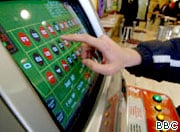Labour’s plans to give local authorities power to curb fixed-odds betting terminals were rejected by Coalition MPs last night.
The party used an opposition day debate to put the issue to a vote in the House of Commons – the Government won by 314 votes to 232.
Labour’s motion – which would not have been binding – was on giving councils additional powers to restrict fixed-odds betting terminals (FOBTs) in bookies.
Roulette
These machines, known as the ‘crack cocaine’ of gambling, allow gamblers to stake up to £100 a spin and up to £18,000 an hour on virtual versions of casino games like blackjack and roulette.
During Prime Minister’s Questions yesterday, David Cameron said he shared the concerns about FOBTs but that the Government are waiting for a report on their impact which is due to be published later this year.
It was a Labour Government which liberalised laws to formally allow betting shops to install FOBTs in 2005.
Campaigning
Labour MP Tom Watson, who is campaigning for changes in the law, admitted that the party had “dropped the ball” in the past.
“We should never really have licensed these machines in the way we did in 2005, and we should put the matter right as quickly as possible.”
People gambled £197 million on high stake betting machines in Liverpool Riverside in 2012, which has the fourth highest rate of child poverty in the country – according to statistics from the Campaign for Fairer Gambling last year.
Control
Ed Miliband said last month Labour would put betting shops in a different class so that councils can use planning powers to control the number opening in their area – currently bookies are in the same class as banks.
He also said the party would look into banning FOBTs altogether.
He said: “In towns and cities across Britain today, you can see how the old bookies are being turned into mini-casinos.
Poorest
“In the poorest areas, these are spreading like an epidemic along high streets”.
“This has huge consequences for our communities, causing debt and misery for families, and often acting as a magnet for crime and anti-social behaviour”, he said.

